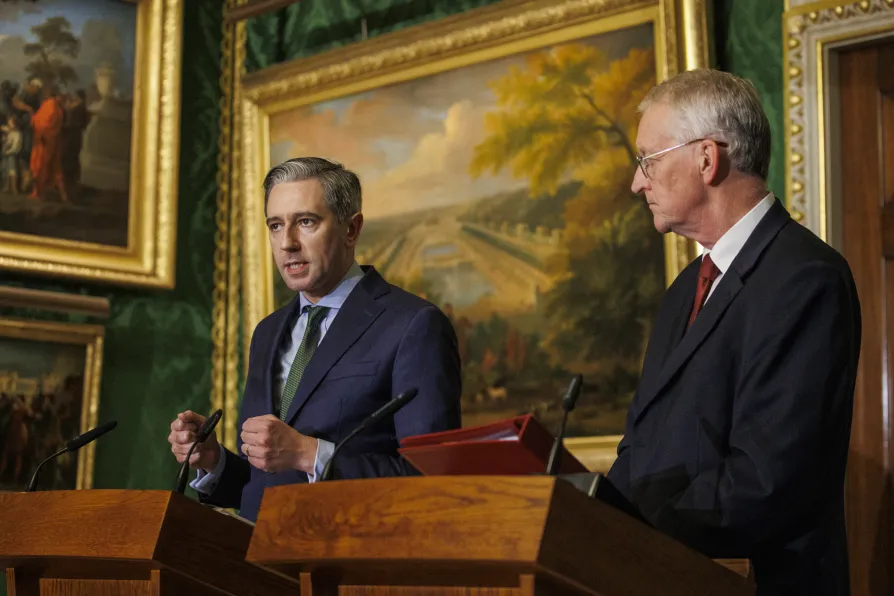
 Northern Ireland Secretary Hilary Benn (right) and Tanaiste Simon Harris (left) speak to the media in the Throne Room at Hillsborough Castle, Belfast, following the publication of a framework to deal with the legacy of the NI Troubles, September 19, 2025
Northern Ireland Secretary Hilary Benn (right) and Tanaiste Simon Harris (left) speak to the media in the Throne Room at Hillsborough Castle, Belfast, following the publication of a framework to deal with the legacy of the NI Troubles, September 19, 2025
NEW MECHANISMS to deal with the Northern Ireland Troubles offers an opportunity to deal with the “unfinished business” of the region’s peace agreement, Britain’s Northern Ireland Secretary Hilary Benn said said today.
Mr Benn was joined by Irish deputy premier Simon Harris at Hillsborough Castle this afternoon to formally unveil the framework, which has been developed following substantive engagement between the two governments following years of impasse over the toxic legacy of the conflict.
“Given the wide range of views held by victims and survivors’ groups, individuals, families, veterans and political parties in Northern Ireland, it is clear that a perfect outcome is not attainable,” said Mr Benn.
“But we firmly believe that this agreement, underpinned by new commitments from our two governments, represents the right approach and history teaches us that peace and reconciliation in Northern Ireland make most progress when our two governments work together.”
Mr Harris described the framework as a “night and day improvement” on the previous mechanisms introduced unilaterally by the last British government.
The new framework, which includes commitments to fundamentally reform the mechanisms established in the 2023 Legacy Act, has raised expectations that the Irish government is moving closer to dropping its interstate legal case against the UK.
Mr Harris said his government would “revisit” its stance on the legal action if the legislative commitments laid out in the framework are faithfully implemented.
Labour came to power with a pledge to replace and repeal the 2023 Legacy Act introduced by the Conservatives, which halted scores of civil cases and inquests into Troubles deaths.
The Act was opposed by victims’ groups and political parties in Northern Ireland, and it led the Dublin government to launch an interstate legal case against Britain, claiming it breached the European Convention on Human Rights (ECHR).
The legislation created a new legacy body, the Independent Commission for Reconciliation and Information Recovery (ICRIR), to take over the investigation of all outstanding Troubles cases.
The Act also contained an offer of conditional immunity to some suspects but this was disapplied after legal action by bereaved families.
The new framework is closer to the details of the Stormont House Agreement of 2014, which were never implemented.
It will see the ICRIR fundamentally reformed to become a Legacy Commission, which will investigate Troubles deaths.
A separate body will be created to deal with information recovery.










